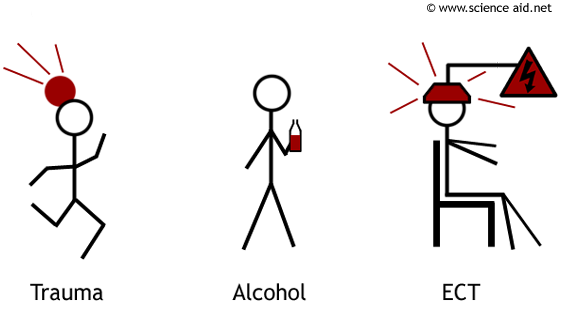Amnesia: What is Amnesia, Causes of Amnesia (Trauma, Alcohol and ElectroConvulsive Therapy)
Edited by Jamie (ScienceAid Editor), Taylor (ScienceAid Editor), SmartyPants, Sharingknowledge
What is Amnesia?
Amnesia is a specific medical condition resulting in memory loss because of brain damage. It isn't just forgetting things. There are two types of amnesia.
- 1Retrograde Amnesia is memory loss for events before brain damage.Advertisement
- 2Anterograde Amnesia, which is the other way around - the loss of memory for events after brain damage.
We will now look at some of the causes of amnesia, the reasons for these and research into them. Be aware that there are other factors that cause amnesia aside from those mentioned in this article.
Trauma
Trauma, also called physical trauma means physical injury, and in the case of amnesia, it is an injury to the head. For example, brain damage due to a car accident, or severe sports injury during. When you receive a strong blow to the head, it can result in a concussion, which is a brief period of unconsciousness.
Post-Concussion Syndrome
In more severe instances, such as when a pedestrian is struck by a car, the unconsciousness can last for weeks and months. The result of this kind of brain damage from trauma, post-concussion syndrome, also known as postconcussive syndrome or (PCS), can occur. PCS causes dizziness, nausea, and blurred vision; and in the long-term: fatigue, anxiety, and depression.
Post-Traumatic Amnesia
We call amnesia following trauma: post-traumatic amnesia. Individuals are confused, not sure where they are and will ask the same questions over and over. Below is a study by Yarnell and Lynch (1970) on the effects of a concussion.
| Aim | To investigate the effects of concussion on memory loss. |
| Method | A field study of American footballers who had been concussed during a game. After regaining consciousness, they were asked about the game just before the trauma. They were asked again between 3 and 20 minutes later. |
| Results | Accurate information was given immediately. Between 3 and 20 minutes later, no information could be given. |
| Conclusion | The trauma has disrupted the process of forming a memory (consolidating a memory trace). It cannot be due to a failure in taking in the information in the first place, as it could be recalled straight after regaining consciousness. |
Alcohol
Drinking alcohol does not directly cause amnesia, nor will getting drunk (at least not in a significant way). Amnesia can be caused in alcoholics because they derive most of their nutrition from drink and hence don't eat very much. This results in a Thiamine deficiency which causes Korsakoff's Syndrome. Retrograde and anterograde amnesia are two of the many symptoms.
Electroconvulsive Therapy (ETC)
Electron-convulsive therapy (ETC) is sometimes used - more often in the past - to treat depression and other mental illnesses. It works by passing a burst of 100 volts of electricity through the brain for less than a second, intentionally triggering a seizure. The belief is that this burst of electricity causes changes in the brain chemistry that can reverse certain kinds of brain damage. Adversely, it causes headaches and memory loss. Both retrograde and anterograde amnesia (mainly retrograde) occur, however in most cases this is only temporary.
Friedburg (1977) found it takes 5 to 10 minutes after receiving ETC to remember who you are, where you are and what day it is. And Brody (1944), cited the case of a woman who forgot how to cook familiar dishes following therapy; both are examples of retrograde amnesia.
You may wonder why this treatment is used at all considering the side effects and the fact that no one really knows why ETC works - although it is thought to involve stimulating neurotransmitters in the brain. This treatment is usually only considered when drug therapy has failed, and patients suffering from severe depression are willing to try it to get rid of their illness.
Referencing this Article
If you need to reference this article in your work, you can copy-paste the following depending on your required format:
APA (American Psychological Association)
Amnesia: What is Amnesia, Causes of Amnesia (Trauma, Alcohol and ElectroConvulsive Therapy). (2017). In ScienceAid. Retrieved Apr 23, 2024, from https://scienceaid.net/psychology/cognition/amnesia.html
MLA (Modern Language Association) "Amnesia: What is Amnesia, Causes of Amnesia (Trauma, Alcohol and ElectroConvulsive Therapy)." ScienceAid, scienceaid.net/psychology/cognition/amnesia.html Accessed 23 Apr 2024.
Chicago / Turabian ScienceAid.net. "Amnesia: What is Amnesia, Causes of Amnesia (Trauma, Alcohol and ElectroConvulsive Therapy)." Accessed Apr 23, 2024. https://scienceaid.net/psychology/cognition/amnesia.html.
If you have problems with any of the steps in this article, please ask a question for more help, or post in the comments section below.
Comments
Article Info
Categories : Cognition
Recent edits by: SmartyPants, Taylor (ScienceAid Editor), Jamie (ScienceAid Editor)




